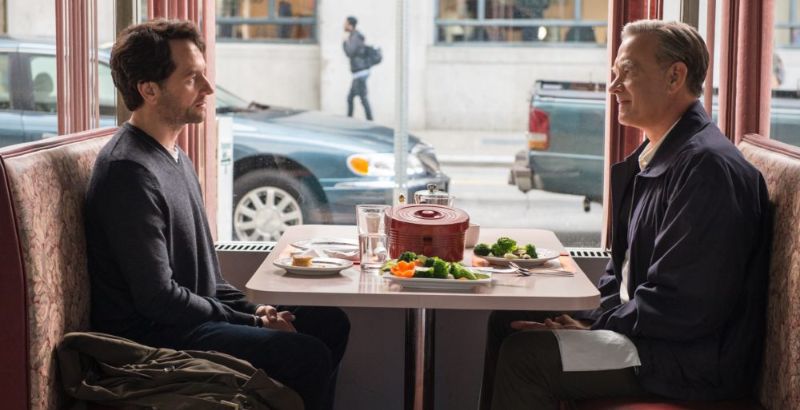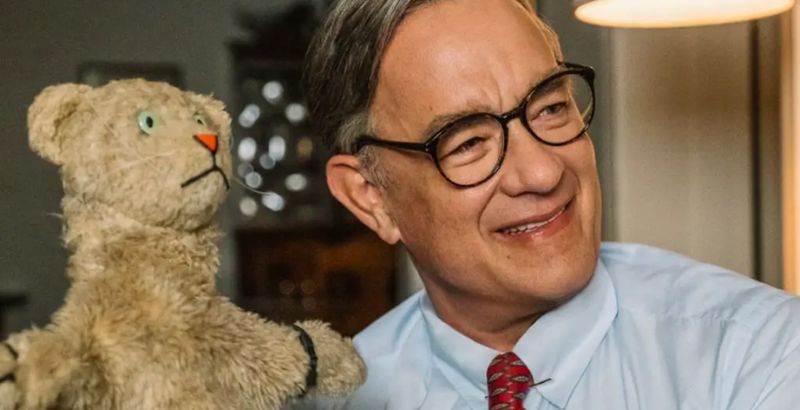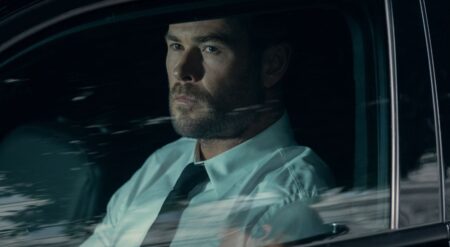
I don’t know what to do with the mad I feel. The world breaks us, it puts its hands in us, extends its claws, and it hardens us. It broke me, or I thought it did. I try to hold it all in, box it up and keep it in tight, but it doesn’t help any. Talking about it, exploring it, that’s what heals us. And years after his death, that’s what Mister Rogers still teaches us. It’s the hope that he keeps giving. As I sat in the theater and the film began, A Beautiful Day in the Neighborhood asked me to confront the mad that I feel. It asked me to realize that I was hurt on the inside and I wasn’t ready.
Starring Tom Hanks as the iconic children’s television star, teacher, and friend Mister Rogers, I was expecting a biopic. One that showed us the ins and outs of his life, but instead, it showed us someone else’s life. Inspired by the 1998 article “Can You Say… Hero?” by Tom Junod, published in Esquire, the film depicts Lloyd Vogel (Matthew Rhys), a journalist for Esquire who is assigned to profile beloved television icon Fred Rogers. This profile also causes Lloyd to confront his traumatic relationship with his father. While the investigative journalist is quick to try to discredit Mister Rogers and Fred as two different people, Lloyd begins to understand that the man on the screen and the man in front of him are the same as he learns what to do with the mad he feels.
The film follows his story, his discovery, and his interaction with Rogers. Starting out as a man who refuses to see the good in people, Lloyd soon understands that Mister Rogers is more than just a persona for a television show. The bulk of the film focuses on Lloyd’s character, his struggle, and his identity. But then, you realize that even though it doesn’t feel like it, A Beautiful Day in the Neighborhood is the most Mister Rogers film of all.
As Fred Rogers, Hanks is breathtaking. His cadence when speaking is spot on and the warmth he exudes in each scene moved me without Hanks speaking. While the words Rogers spoke are important, it was the silences he let you fill and the openness he showed that truly made him unique. This is what we see on screen in one of the most moving performances of the year.
At about the halfway point, Hanks asks us to reflect on the people who loved us, making us who we are, for one whole minute of silence. The theater, which was alive with digging for popcorn and adjusting of seats, stopped silent. I stared at the screen, and as the camera closed in on Hanks’s face, I saw the character he was portraying, but most importantly, in the silence, I thought about my parents, my grandparents, and the aunts I had long stopped talking to, and my husband. All of them were me, in different parts, and not all of them I talked to, either by choice or because they had passed. But at that moment, I was so overwhelmed with emotion from the call to action in the middle of a film, that I couldn’t think of them.

I cried. I cried hard and as I tried to stifle myself, Hanks ended the minute, thanking Lloyd for the moment and Lloyd fought back tears as I held my hand to my mouth. “What do you do with the mad you feel,” I thought. And it hit me, right smack dab in the middle of the film. This was a film focusing on a man who wasn’t Rogers, and yet it brought his legacy to life. Somehow, in Lloyd’s story, the team behind the film is able to bring Rogers back to us.
They don’t only do this through Hanks’s stellar performance but in how he reached into the audience, held us, and asked us to confront our pain. As Lloyd sits with Mister Rogers, we sit the calm and empathetic pastor too. As the camera pulls to a tight shot of Hanks’s face, it’s clear that he isn’t just talking to Lloyd, but to us too. The ability of Hanks to engage with us through the screen with as much weight as when he interacts with Lloyd. We’re on this ride too, asked to confront our lives and decide what we do with the mad we feel.
A Beautiful Day in the Neighborhood isn’t about Mister Rogers, it’s about Lloyd. At the same time, it’s the most neighborly film there could be by showcasing our capacity for empathy and the impact just a few conversations with Fred Rogers can have. A Beautiful Day in the Neighborhood captures Rogers’ legacy in an emotional, raw, and beautiful way. It confronts death, anger, and heartache, all while the audience is brought into the film like an episode of the television show.
There is humor, there is light, but most of all, A Beautiful Day in the Neighborhood has deep, authentic, and reverent empathy. The kind we saw on the television screen, the kind we learned to enact. Emotionally, I was not prepared for this film, but it was exactly what I needed to see.
A Beautiful Day in the Neighborhood will be out in theaters nationwide on November 22, 2019.
Still need tickets? Grab some using our Fandango affiliate link.
A Beautiful Day in the Neighborhood
-
Rating - 10/1010/10
TL;DR
There is humor, there is light, but most of all, A Beautiful Day in the Neighborhood has deep, authentic, and reverent empathy. The kind we saw on the television screen, the kind we learned to enact. Emotionally, I was not prepared for this film, but it was exactly what I needed to see.






